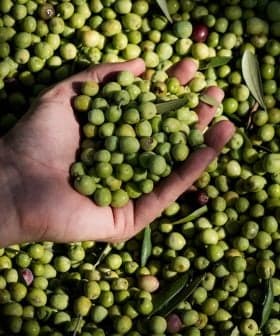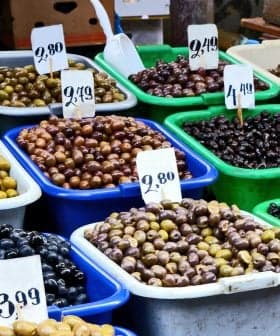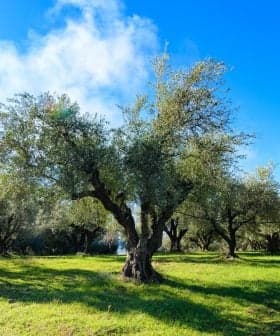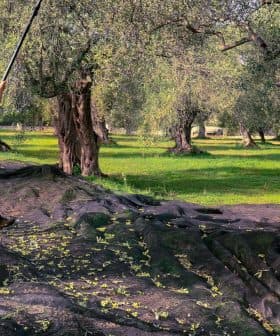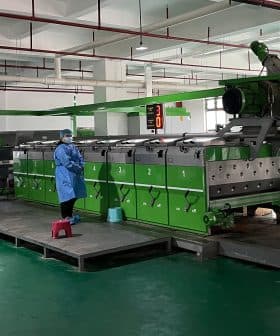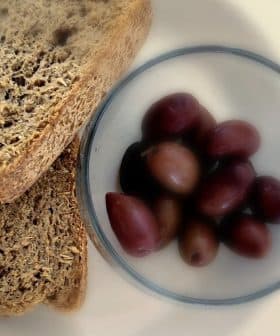Drought Unlikely to Affect Yield, Say Some Greek Producers
Dry conditions over the last six months in Greece have created anxiety in the olive oil industry over yield this season. Producers are reporting, however, that their production might be better than expected.
The dry weather in Greece has posed a threat to the olive oil production season, with non-irrigated groves at risk of low yields due to prolonged drought conditions. However, producers in different regions of the country have varying projections, with some expecting a decrease in production while others anticipate an increase in yield despite the dry weather. The total olive oil crop in Greece for the current harvesting season remains uncertain and will likely be influenced by the impact of the drought.
In Greece, the continuous dry weather conditions of the last six months have threatened to hammer the season’s olive oil production.
Irrigated olive farms are not as affected, but the majority of the groves in the country are non-irrigated and prone to low yield due to prolonged drought conditions. Showers in late October in several areas were not expected to add more juice to the olive fruits.
There is a lot of hype about the drought but I do not expect any serious damage coming our way.
Olive Oil Times contacted olive oil producers and mill owners in different regions of the country to ask about their projections and hopes for the season. Their answers indicated that the predicament might be better than initially expected, depending on the specific area and its microclimate.
See Also:Complete Coverage of the 2017 Olive Harvest
‘Peza Union’ in Crete near Heraklion is a cooperative of oil and wine producers where around 5,000 to 6,000 tons of olives are processed each year in the union’s two oil mills. Their spokesperson Anestis Vasileiadis told OOT: “This year’s yield of olive oil is expected to be decreased but not because of the drought; it is more due to the olive trees production cycle which allows the trees to be productive only every other year. Dry weather is something we are accustomed to, since traditionally our area does not get a lot of rain”.
The oil mill of Kasimatis Bros resides at Kastella in central Euboea. “Despite the drought, I expect the olive oil quantity to be the same as last year. But I also expect the taste of the oil to be on the bitter side because of the drought,” they told us.
Staying in Euboea, Papanastasiou brothers own an olive oil mill near Istiaia, in the northern part of the island. Dimitris Papanastasiou commented that: “Drought has put harvesting on hold because producers wait for the olive fruits to mature, but I do not see a cut down in production. I rather expect an increase in the yield by 40 to 50 percent compared to last year and I also expect to get oil of excellent quality since the fruits had minimal olive fly infection this season.”
© Olive Oil Times | Data source: International Olive Council
The island of Lesvos is well known for its distinctive olive oil. Apostolos Mavrikos owns a mill at Pamfyla north of the capital city of Mytilene. “The drought in our area was unprecedented. I expect olive oil production to be cut down by 20 percent compared to last year,” Mavrikos told OOT.
Afentoulis Bros is an oil mill at Chalkidiki in northern Greece. Its owner reported that “dry weather did not harm the olive trees in our area. Harvesting has already begun and I expect a big increase in the oil yield than last year.”
Spyros Kirkinezos runs an oil mill near Messolongi, 50 km northern of Patras. The situation there seems unpromising: “I see a cut in oil production by 30 percent compared to last year. People are frustrated and do not want to harvest the olives until it rains. But any rain now will not bring more oil; it is just that it won’t taste that bitter,” Kirkinezos said.
Moving south, the Ilias Zourtsanos and Co. oil mill resides just outside the town of Kyparissia in western Messinia. Zourtsanos commented, “I expect oil production to be reduced by only 10 percent than last season. There is a lot of hype about the drought but I do not expect any serious damage coming our way. I also foresee that the current season’s olive oil in our territory will be of exquisite quality since we had no olive fly activity during the summer.”
At the neighboring region of Lakonia the Cheliotis family has worked with olive oil for more than 50 years. The family has its own olive orchards and an olive oil packaging plant near Sparta. “Despite the fact that it didn’t rain the past months, olive trees in Lakonia were unharmed and we expect a rise in oil production by 30 percent compared to last year,” they told us. “The whole Lakonia region is expected to give more than 25,000 tons of olive oil.”
The drought will certainly take its toll in some areas of Greece regarding the olive oil yield, but it will leave other territories unaffected. On top of that, there are cases where more oil is coming out despite dry weather, like in the regions of Lakonia, Chalkidiki, and Euboea. It remains to be seen what the total olive oil crop will be in Greece when the current harvesting season will end probably by late January 2018.



